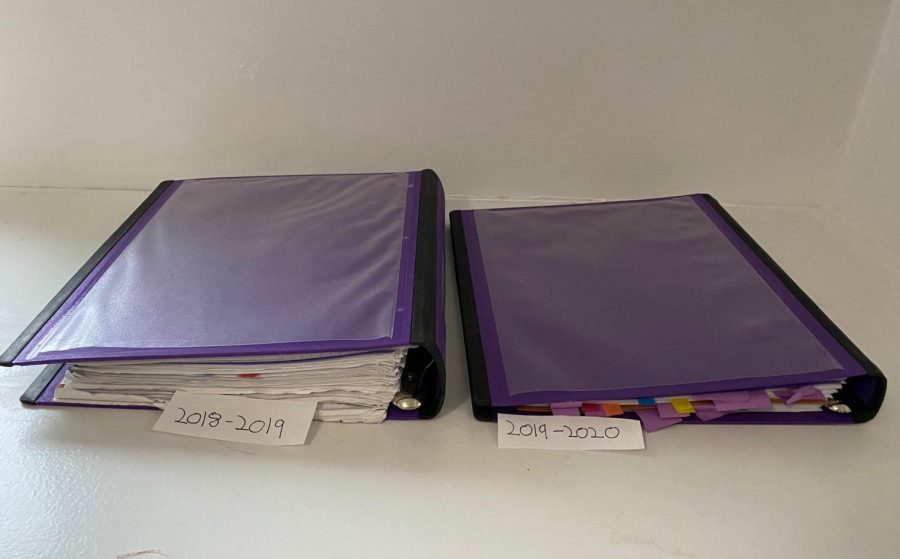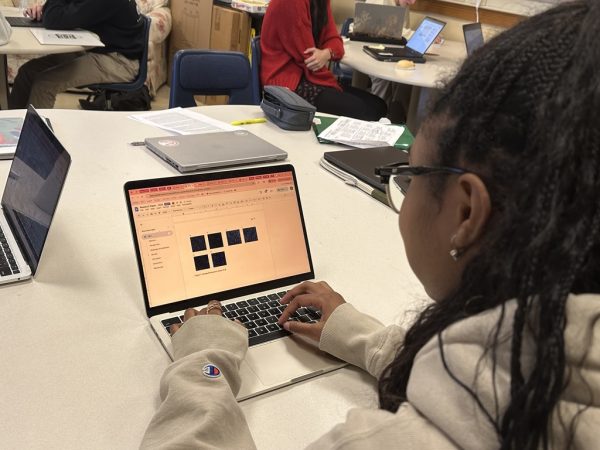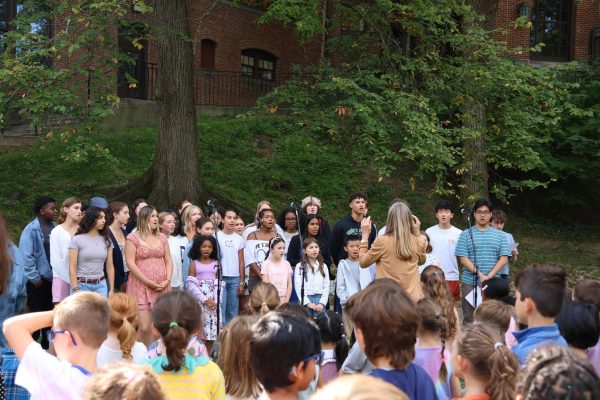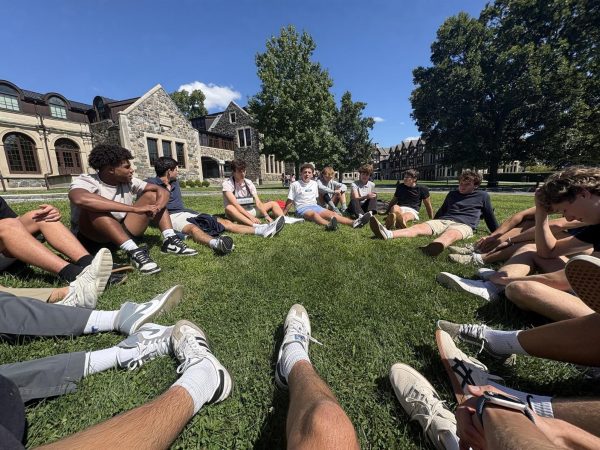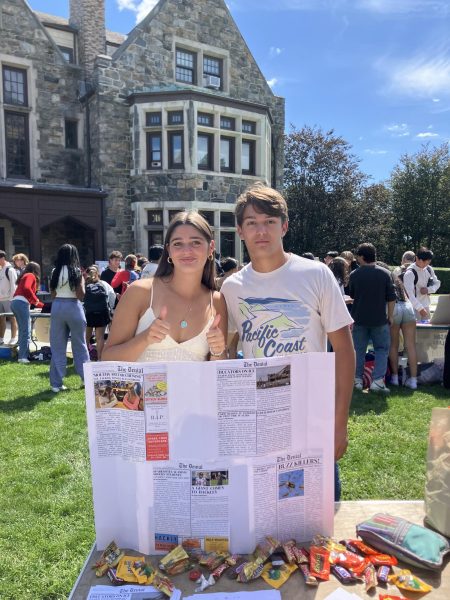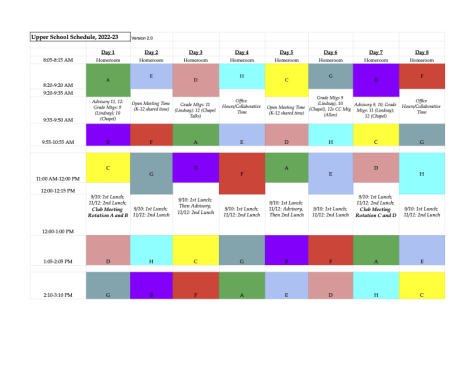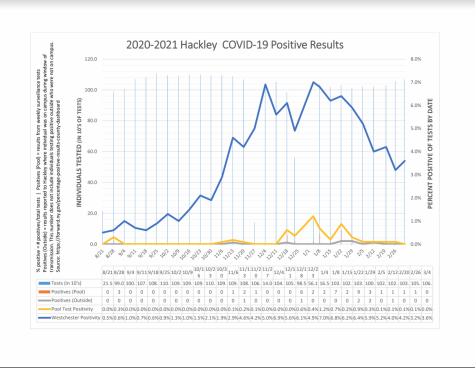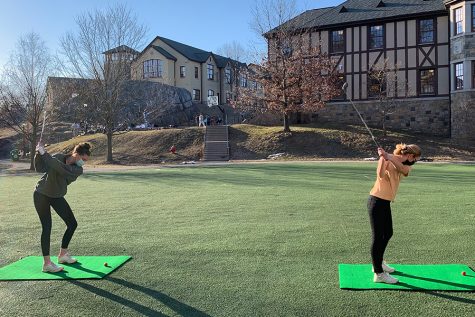Academic Material Missed During Remote Learning
Credit: Kami Lim
As the remote school schedule shortens the amount of class time spent, many students fear having to continue remote learning into the summer. Workload and less class time than normal are reflected in comparing binder sizes from the previous year.
“Going down to just to classes that are 45 minutes each, I have really tried to cut the curriculum and unfortunately I do not really get to go into depth on topics I am covering with my classes,” Ms. Crepeau, Upper School Dean and French language teacher said.
At the beginning of online school, teachers were allowed to assign 30 minutes of outside work per class period. Even with the recent increase of 30-45 additional minutes per week, the workload still does not reflect the normal amount of time spent in the classroom or on outside work.
Looking at the new remote school schedule, it is clear that the amount of class time that would regularly be observed in physical school cannot be matched during online school. Even with the additional 30-45 minutes per week of work, the amount of material that is covered in remote school will not be all of the necessary material for each subject. Subjects such as math, language, and history build on the previous year’s material, and that understanding from the previous year is needed to continue moving forward.
In the lessened curriculum, some teachers have looked to establish the skills they believe are important regarding the course they are teaching. Ms. Crepeau has found that remote learning has pushed her to have fewer assessments and more practice with the material. This material now incorporates the skills that would be tested in assessments.
“At the start of next year, the math department is prepared to make the necessary adjustments to course content in classes that require topics that were never reached the previous year,” Ms. Casper said.
Ms. Casper continued, saying that the math department has been preparing for how the missed material will affect the next year by looking at curriculum reform for the early fall. While the departments are getting ready to compensate through curriculum adjustments, it also raises the question of whether the missed material will create a domino effect for upcoming years.
Ms. Crepeau feels that while there may not be a direct domino effect in upcoming years, there will have to be direct communication with the teachers taking over the course for the next year. This will allow teachers in the upcoming year to go over the previous year’s material to make sure there are no gaps from the remote learning period.
“I don’t think there would wind up being a domino effect in future years since the content of courses is being changed all the time…With quizzing and testing at a minimum, we are spending the majority of class time moving forward with the curriculum,” Ms. Casper said.
Although there is still uncertainty about what new precautions should be taken and how the administration is planning on moving forward, this experience has shown the preparedness of the school in their transition online. Ms. Casper stated that she felt that the school’s preparation for remote learning was smooth and she would not “change too much” of their planning.
Outside the Hackley community, schools in Miami, Florida intend to start school two weeks early or continue to learn over the summer. This means that many schools will begin on July 27th. Students identified as “fragile,” those who are English language learners, performing below grade level, or those who have a disability will begin distance learning again starting June 8th. While continuing remote learning over the summer does not apply to the Hackley community, other schools’ usage of the summer for year-round schooling demonstrates their attempts to catch students up for the upcoming school year and make up for missed material.
“With the new online learning schedule, it is an uncomfortable thought that remote learning may have to extend into the summer to compensate for the material being lost.” Sydney DeFilippo said.
While Hackley does not intend to continue remote learning into the summer, apprehension among students has become common as they wonder what will happen to the course work that will not be finished this school year. Mr. Wirtz, Head of School, announced on May 12th “that we may start classes as early as August 31, backing up all other pre-school commitments by a week as well,”. These constant small changes to the schedule represent the uncertainty amidst the pandemic and how the school schedules are subject to constant change to reflect what is safest for the community.
“I think for the suddenness of it, the schedule was very considerate of students’ energy levels….If this were to go on, I would definitely want to meet with my students more because there is a lot of gap between when we meet, it is hard to keep up with the material, and I think that it is precious time to have class time. I would like to see more class time added for the students, but I do want to be very thoughtful of the students’ well being.” Ms. Crepeau said.
Looking at the next year, there is an important balance between the number of classes for a student and covering enough material. Students’ well being is important both throughout the course of the pandemic and for their mental health.
Closer to the Hackley community, other independent schools have taken different remote learning approaches. At Riverdale Country Day school, there are two live classes each week for each course and five 45 minute assignments for each day of the week. The school’s differing approach to a breathable school schedule that still does not extend into the summer represents how other independent schools intend to create a balance of education and respect to family situations pertaining to the pandemic.
Constant curriculum reform of how the courses are taught is an important part of making sure that the courses stay up to date. While other schools are looking to extend their remote learning into the summer, it is clear that Hackley has been working to keep school as normal as possible while balancing with the priority of education.

